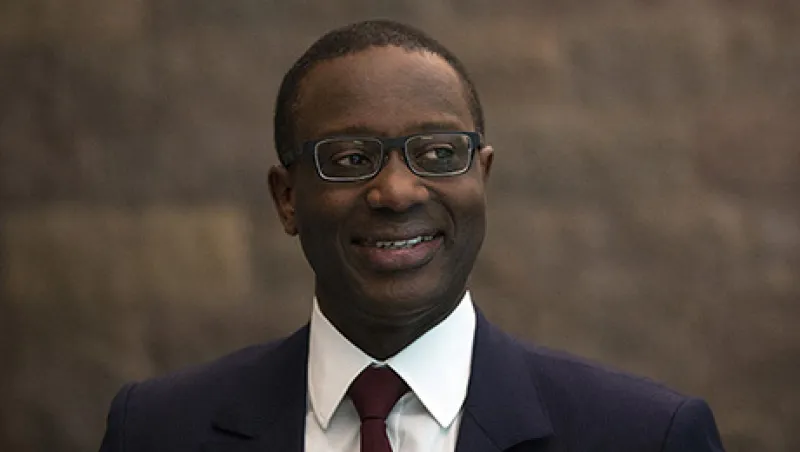The surprise appointment of Tidjane Thiam, head of U.K. insurer Prudential, to replace Credit Suisse’s longtime CEO, Brady Dougan, is expected to speed up the Swiss bank’s transformation into more of a wealth manager. The question is how quickly Thiam can accomplish this, given the Swiss bank’s traditional emphasis on investment banking.
At a Tuesday press conference at Credit Suisse headquarters in Zurich, the 52-year-old Thiam, a native of Côte d’Ivoire, said he would offer no details on his plans before taking over in June. “I am convinced this is a great opportunity for growth, especially in the area of wealth management,” he said. He played down the fact that his résumé doesn’t include any stints at investment banking and noted that at Prudential he often immersed himself in derivatives and hedging. “So I am very confident I can understand everything an investment bank does,” he said.
But Credit Suisse board members made clear they picked Thiam for his experience at managing assets for insurance clients. Chairman Urs Rohner noted that the bank had already moved under Dougan to allocate as much capital to wealth management as to investment banking; the latter currently uses 58 percent of the group’s capital, down from 65 percent in 2009. “It is clear that with today’s announcement, this will continue and accelerate,” said Rohner, sitting between Thiam and Dougan.
Shareholders welcomed the prospect of a greater emphasis on wealth management, which requires less capital than investment banking and generates steadier earnings. Credit Suisse’s stock price rose by more than 8 percent on the Zurich stock exchange Tuesday after the announcement of the management change. The shares were up 11 centimes, at 25.11 Swiss francs, late Wednesday in Zurich. (The franc is at virtual parity with the dollar currently.)
Global regulators have imposed sharply higher capital requirements on investment banks in a bid to avoid a replay of the financial crisis. The Swiss government is due to announce even tougher rules on Credit Suisse and UBS, the country’s two big banks, later this year. UBS, which always has been more of a wealth manager, began to seriously downsize its investment bank three years ago. “But Credit Suisse has a very strong investment banking culture, so there probably won’t be as dramatic a shift toward wealth management as we saw at UBS,” predicts Andreas Venditti, a Zurich-based analyst at Vontobel Bank.
Despite controversies, Dougan, still only 55, has remained at the helm of Credit Suisse for eight years. He is one of only three CEOs of major international banks — alongside Lloyd Blankfein of Goldman Sachs Group and Jamie Dimon of JPMorgan Chase & Co. — who have held their posts since the financial crisis erupted. Dougan steered Credit Suisse through the turmoil without the need of a Swiss taxpayer bailout, unlike UBS. Subsequently, he had to pare back the investment bank’s fixed-income business after a costly expansion of its government bond–trading business failed to generate significant profits.
There were calls by Swiss politicians for his resignation last year after Credit Suisse pleaded guilty to U.S. criminal charges and paid $2.6 billion in fines for helping Americans evade income taxes with Swiss accounts. The bank’s net income fell 19 percent last year, to Sf1.9 billion, and its share price fell by 29 percent in 2014, compared with a drop of 11 percent for the STOXX Europe 600 Banks index.
In recent months Dougan seemed more secure. But Credit Suisse now says that he and Rohner began a search for his successor last fall both within the bank and outside.
Thiam has also mixed controversy with success. Born in Côte d’Ivoire to a wealthy family, he moved to Paris, where he obtained engineering degrees from the prestigious École Polytechnique and the École Nationale Supérieure des Mines de Paris, then went on to receive an MBA from INSEAD. After several years at consultants McKinsey & Co. in Paris and New York, he moved back to Côte d’Ivoire and became minister of Planning and Development. In 1999 the government was overthrown, and Thiam fled back to Paris, where he returned to McKinsey as a partner.
Thiam joined Aviva in 2002 as head of strategy and development. He rose to chief executive of Aviva Europe and executive director with a seat on the U.K. insurer’s board, and was touted as heir apparent to then-CEO Richard Harvey. But he left in 2008 to join Prudential as its CFO and rose to CEO the following year. He came close to losing that post in 2010 when dissident shareholders blamed him for mishandling a failed $36 billion bid by Prudential for AIA Group, the pan-Asian insurer that was then an arm of the ailing American International Group. But under Thiam, Prudential’s market cap has almost tripled, to £42 billion ($63 billion). The announcement of his departure caused the insurer’s stock price to fall by 3 percent on Tuesday; it rebounded by 14.5 pence on Wednesday to stand at £16.265.
Thiam will face a number of challenges at Credit Suisse. Return on equity was only 4.4 percent last year, not even close to Dougan’s 15 percent target. The bank’s 80 percent cost-to-income ratio was well above the 70 percent level Credit Suisse was aiming for. “Of course, there are difficulties — that’s beyond question,” said Thiam at the press conference. Like Dougan, he sees affluent Asians as the biggest growth market both in investment banking and wealth management.
Dougan will remain at Credit Suisse throughout the transition and says he doesn’t yet have any future plans. “I think we have a lot to be proud of,” he said at the press conference. “There are a lot of things I could have done differently, should have done differently.”






